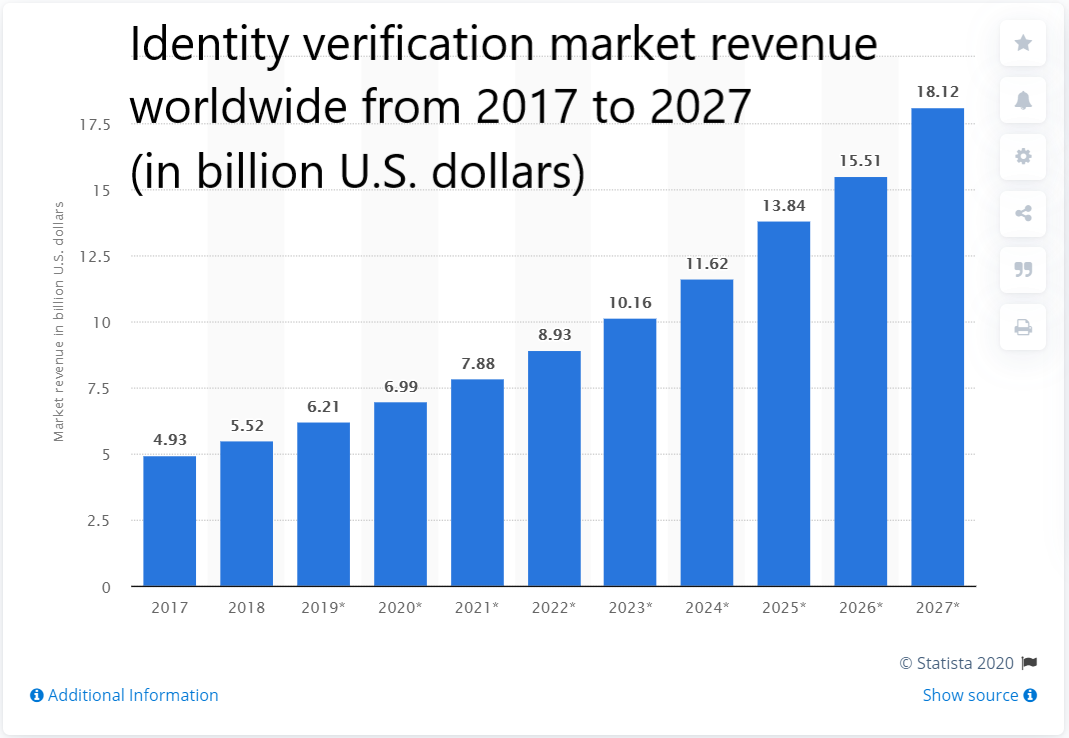Top Benefits of Flexible Identity Verification
As identity theft cases are increasing quickly, every company has to set up a cutting-edge verification tool to guarantee that only genuine users are accessing their solution.
The verification process is indispensable from the perspective of user experience. If your company is secure, individuals will feel confident about using your product or service. However, keep in mind that not every industry has the same need for identity verification.
If you are unsure about your requirements, you can choose a flexible identity verification platform. It gives you the freedom to select the verification technique according to your need and decreases your overall identity verification overheads.

Nowadays, proof of identity is vital to use any online service or product. Whether you’re getting a virtual payment or subscribing to an entertainment platform, you perhaps will be requested to send a legit identity document. But what if fraudsters get access to the personal info you share over such portals?
With bits of important personal info you provide, impostors can collapse your credit history and make huge transactions to empty your account. That’s why companies must invest in a potent identity verification tool like Trust Swiftly that helps them identify the difference between authentic and fake clients, and avoids different kinds of scam.
Adopting flexible identity verification is a powerful solution to stop identity frauds. In this article, we’ll explore what flexible identity verification is, its various methods, and how it can help your business.
What is Flexible Identity Verification?
With the advancement in technology, impostors are also becoming advanced. So, you can’t bank on traditional identity verification tools only to prevent frauds. Moreover, it’s no longer enough to have a single verification solution.
To guarantee that your services are being used by authentic customers only, you should search for a flexible identity verification tool that enables you to select the suitable verification process according to the problem.
Through flexible verification, you can leverage the combination of various verification approaches to acclimatize to discrete business practices. As every company has individual verification objectives, flexible verification is the perfect methodology to achieve those objectives. It targets to solve particular business problems like averting scams, enhancing liability, and more.
A flexible identity verification tool employs numerous verification techniques to defend a company from different identity risks. This kind of verification safeguards your digital assets with numerous authentications. Simply put, flexible identity verification uses adaptable technology to deliver the precise verification process you need.
Now let’s take a look at the various kinds of identity verification procedures used in flexible verification.
Kinds of Flexible Identity Verification Approaches
Flexible identity verification empowers companies to use various sorts of verification techniques, but a few common ones include:
Identity Documents – It is a verification process that matches the identity an individual claims to have with the data that substantiates it. There are several documents that can be used to verify identity like birth certificates, passports, ID cards, and driver’s licenses.
Two-factor Authentication – Also known as two-step authentication or dual-factor verification, it relies on a person providing a password or passcode, as well as another factor, normally a security token or a biometric element like a fingerprint or facial scanning.
Knowledge-based Authentication – It’s a verification method in which the person is asked to answer at least one “secret” question, similar to “forgotten password” scenario. However, this information is typically more advanced than the type of information an impostor might be able to access via your email or device.
Electronic Signature – It comprises a series of encrypted data attached in an electronic message with complete integrity. Primarily, it is a legal method to seek consent or approval on electronic documents or forms.
Biometrics – These are physical or behavioral human physiognomies that can be used to digitally recognize an individual to provide access to systems, gadgets, or information. For instance, fingerprints, facial patterns, voice, or typing cadence.

Advantages of Flexible Identity Verification for Businesses
Every business has different verification goals and means for achieving them. Flexible identity verification helps companies in the following crucial ways.
Delivers Cost Efficiency
Due to the increasing security threats, businesses today are spending a huge amount of funds on identity verification tools. In fact, over the period between 2017 and 2027, global spending in the identity verification market is predicted to expand by over 13 billion USD, growing from 4.93 billion in 2017 to more than 18 billion in 2027.

However, you can control your identity verification expenditure by selecting flexible identity verification tools.
Each identity verification technique costs a specific amount. For instance, identity data verification may cost less than a dollar, whereas document verification may cost some dollars. Although the difference may seem trivial, if you have a company that has to carry out thousands of verifications every day, you will observe that you’re expending more budget than you expected.
For instance, suppose you want to authenticate a client’s identity on simple transactions. Using document capture and verification on every acquisition may needlessly increase expenses. The right approach to keep the verification cost low is to use the appropriate identity verification technique for every transaction.
For a typical transaction, you can perform verification with identity data that is low-cost. But, occasionally, identity data by itself is not sufficient to authenticate a client. You can then shift to a technique that delivers an advanced level of verification, like biometric authentication.
Therefore, you can optimize the verification procedure’s expense and select the right identification approach for different problems.
Adapts to Regulatory Compliance
Offenders use virtual financial platforms to cover their wrongdoings and the money resulting from them. Therefore, legal establishments have made it essential for banks, businesses, fintech, and other fiscal organizations to adhere to KYC (Know Your Customer) and AML (Anti Money Laundering) directives.
KYC refers to authenticating the identity of your clients, either before or during the time that they start doing business with you. It also refers to the regulated bank customer identity verification practices to evaluate and monitor customer risk. On the other hand, AML defines the legal controls that necessitate fiscal organizations and other regulated bodies to stop, identify, and report money laundering undertakings.
Did you know, about twelve of the global top banks were charged with penalties for not conforming to KYC and AML in 2019? As the biggest offender, Switzerland was hit with a $5.1 billion penalty by the French Criminal Court for not conforming to AML.
Unfortunately, it’s perplexing for many companies to abide by multidimensional legal and supervisory requirements. They not only have to manage their liability, but also have to stay compliant simultaneously.
With robust and flexible identity verification tools like Trust Swiftly, you can conform to these regulations quickly. Suppose a new directive necessitates you to improve your verification method swiftly. A flexible identity verification tool allows you to quickly deploy an authentication technique such as biometrics. Therefore, you can rapidly resolve your compliance challenges.

Satisfies Unique Requirements of Different Industries
Nowadays, every industry needs a forceful identity verification tool to avoid frauds and offer their clients a safe user experience. Yet, it’s critical to understand that every industry has different needs for identity verification.
Your onboarding process may be different depending on your business practices, industry standards, and compliance directives. For instance, fiscal organizations and healthcare companies are different so their verification processes are also quite different.
Additionally, industries also vary with time. Protocols, risk tolerance, and demographics develop over time, necessitating new means of authenticating transactions. As a result, it would help deploy an identity verification tool that allows you to select a verification technique according to your requirements and without exceeding your budget.
A flexible identity verification platform like Trust Swiftly uses numerous technologies to offer the exact verification technique you need. As you get a tailored verification solution, you can decrease verification expenditures to a great level.
Embrace Flexible Identity Verification With Trust Swiftly
Identity verification is an outright necessity for most companies. However, there are numerous ways to do it and each has its own strengths and weaknesses. By combining the different methods discussed, you can create a more secure, flexible identify verification solution.
Flexible identity verification empowers your business to manage costs while keeping pace with varying industry and supervisory challenges. Trust Swiftly is a powerful tool that uses 10+ verification methods that will put a stop to your fraud concerns. It provides an easy-to-use and dynamic platform to authenticate your customers no matter your size or attacks encountered.
You can quickly respond to threats with dynamic verification and expose current fraud and identify patterns of corrupt users. Moreover, it offers global coverage, allowing for expansion without security compromises.
At the same time, Trust Swiftly ensures compliance with privacy regulations via cost-effective solutions. It provides you with all the verification methods you need to safeguard your business from fraud, money laundering, juvenile signups, and other regulatory fines.
If you want to implement a flexible identity verification solution, get in touch with our consultants to request a personalized demo.